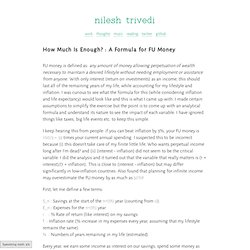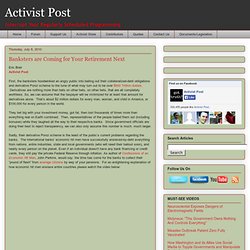

How Much Is Enough? : A Formula for FU Money. FU money is defined as: any amount of money allowing perpetuation of wealth necessary to maintain a desired lifestyle without needing employment or assistance from anyone.

With only interest (return on investments) as an income, this should last all of the remaining years of my life, while accounting for my lifestyle and inflation. I was curious to see what the formula for this (while considering inflation and life expectancy) would look like and this is what I came up with. I made certain assumptions to simplify the exercise but the point is to come up with an analytical formula and understand its nature to see the impact of each variable. I have ignored things like taxes, big life events etc. to keep this simple.
I keep hearing this from people: if you can beat inflation by 3%, your FU money is 100/3 = 33 times your current annual spending. First, let me define a few terms: So our goal is to find S_0 (initial savings) such that S_n becomes 0 when n = N. E_n = E_0(1+f)^n = E_0F^n. Don’t Indulge. Be Happy. When Money Can Buy Happiness, Use It. Checkbox Syndrome: Why We Spend Money on Things We Don't Need (and How to Avoid It) I've been gradually adopting a more minimalistic posture towards consuming and keeping things these past few years.

Latest thing I did not upgrade: iPad. The iPad 2 is good enough for my needs. What I do need though is a capacity upgrade in it, so I might buy an iPad 2 64Gb in the future (currently at 16Gb, wasting tons of time making constant clean ups). Yesterday I trashed like 8 garbage bags filled with product boxes and cases. Several times you keep them because "who knows, maybe it's useful when I move or if I decide to sell it". Made up a list of books I know I'll never pick up again and will sell/donate them later on.
Sold some 3 still kinda good gadgets on auction sites this year. Cut down my game budget to "only when I have the time to". Still holding to my dumbphone 'till I get a better excuse to buy a smartphone other than "taking better pics" with it. That said, I still spend too much money on useless crap. Some are simply irrational - aka hobbies. For instance, groceries. Banksters are Coming for Your Retirement Next. Eric BlairActivist Post First, the banksters hoodwinked an angry public into bailing out their collateralized-debt obligations and derivative Ponzi scheme to the tune of what may turn out to be over $600 Trillion dollars.

Derivatives are nothing more than bets on other bets, on other bets, that are all completely worthless. So, we can assume that the taxpayer will be victimized for at least that amount for derivatives alone. That’s about $2 million dollars for every man, woman, and child in America, or $100,000 for every person in the world. They bet big with your investment money, got fat, then lost thousands of times more than everything real on Earth combined. Sadly, their derivative Ponzi scheme is the least of the public’s current problems regarding the banks. . , John Perkins, would say: the time has come for the banks to collect their “pound of flesh” from average citizens by way of your pensions. As we near the End Game.
Net Worth and Pleasure. In a post a few days ago, I made an offhand comment about how I didn’t really receive personal pleasure from seeing my net worth increase, though I once did.

A few people emailed me on that subject, so I thought I’d clarify what I meant. When I first began to overcome my personal finance mistakes, I found that calculating my net worth and looking at the change from month to month was incredibly powerful. It was a single number that provided “proof” that I was making better decisions than I was making before. An increase in net worth meant that I was unquestionably spending less than what I earned, which is the key to personal finance success. An increase in net worth meant that all of the hard day-to-day choices I was making were actually adding up to something big. It was exhilarating. Over the ensuing years, however, things changed in my life.
In other words, I began to really see the impact that our financial choices are having on our day-to-day life. Today, things are different. Track How Happy You Are with Your Purchases in Your Ledger.